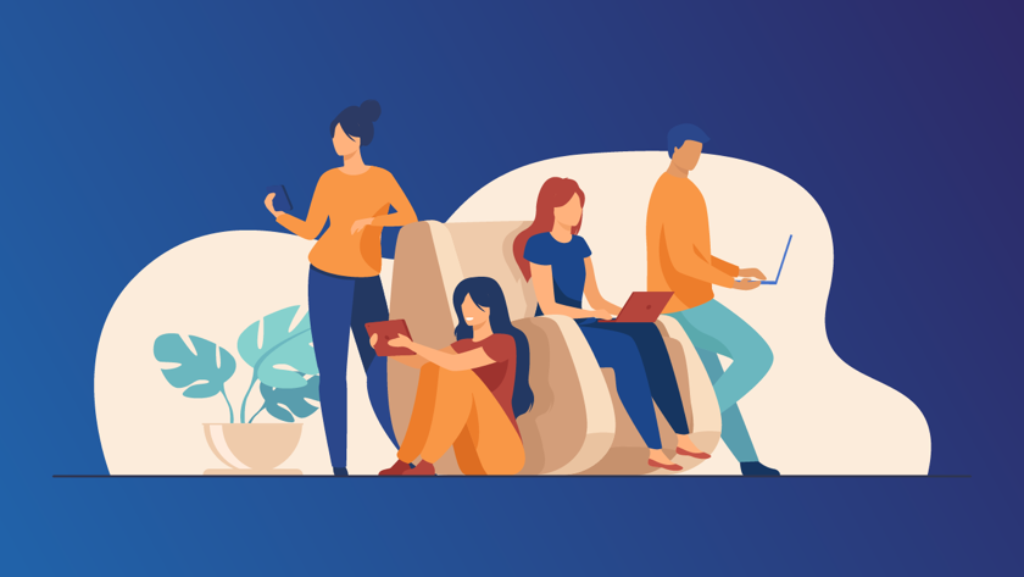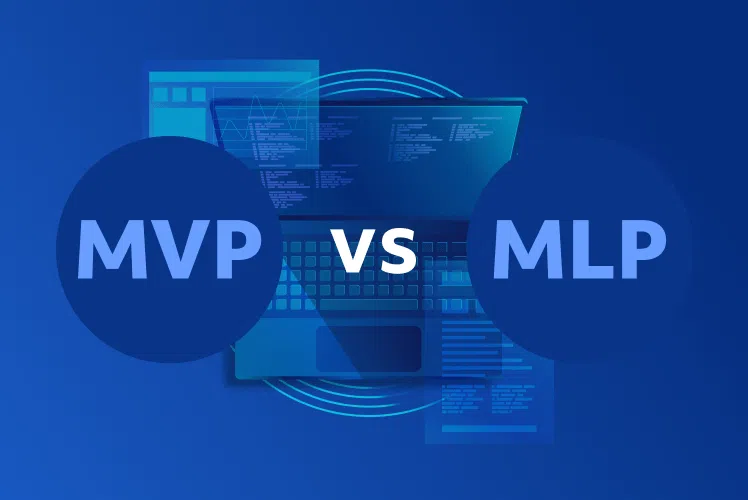Table of Contents
Technology is everywhere and is continuing to seize more and more aspects of our lives. We already have smart deliveries, robotic assistants, and AR vision and we can only guess what’s coming next. So are all these changes really good or are we becoming overly dependent on technology? Spoiler: there is no right or wrong answer.

As written by Bradbury and Clarke
Let’s unwind back to 1950 – 1970 and remember the time with no Internet, headphones, and cell phones. This era can be called the dawn of sci-fi literature and the most well-known sci-fi authors actually predicted certain technological trends while letting their imagination roam loosely in their minds.
It makes sense to look back and remember how people lived without so much technological advancement on their side. Technology was used for manufacturing mainly and such aspects of lives as entertainment, healthcare, and finances remained tech-free. Partially, because there were no tools to replace people and partially because people believed that only they were capable of performing certain tasks.
This, however, did not stop the authors from fantasizing about the topic of our future and the role that technology would play in it. Some of the most interesting predictions are:
- Earbuds: described by Ray Bradbury in “Fahrenheit 451” (published in 1953) as something a person could place in his ears and receive audio entertainment, available to him only.
- Geosynchronous satellites: the idea was first proposed by Arthur C.Clarke in 1945. He suggested that satellites could be placed in the Earth’s orbit in order to transmit signals across the globe for lightning-fast communication.
- Credit cards: in his book “Looking Backward” (published in 1888), Edward Bellamy predicted that people would possess a universal card to pay for goods and services instead of paper money and coins.
- Security cameras: if you read “1984” by George Orwell (published in 1948, ironically), you might remember him talking about interconnected surveillance used for social monitoring.
Did these authors think about how much technology would integrate with society? Probably, not. Their novels were seen as bold and hard-to-believe fiction – yet here we are, using our mobile devices to pay for digital services via the Internet. So how does it impact us?
When talking about dependency of any kind, it’s important to understand what kind of dependency is present. Is it negative and hurts the dependent person or is it positive and provides just the right amount of assistance to become integral? Let’s try to find an answer.
The status of technology today
When talking about the positive impact of technology on our lives, the first thing that comes to mind is tech-equipped healthcare and security. Technology has made (and keeps making) a huge contribution to the quality of our living and helps us safeguard ourselves against many threats. Just think about the development of medicine and the speed of drug research if we compare it to the same processes but fifty years ago. Or think about how easy it is now to track a person so you won’t have to worry about your loved ones coming home late at night.
On the other hand, technology replaces certain activities that do not, in fact, need that. Here are some examples of how technology impacts our lives and whether it’s necessary or not.
Self-monitoring
Do you know your heartbeat right now? No cheating – get your eyes off your smartwatch or MiBand. That’s what we talk about – with the blanket distribution of technology, we rely too much on our smart devices and forget to take care of ourselves without technical assistants.
Take runners, for example. Today, technology provides them with lots of valuable assets: smart devices for monitoring their state of health and distance, virtual assistants, etc. But what if you take all these goodies away? It would be really hard for a modern runner to independently monitor their distance and heartbeat rate – yet, these skills are critical in order to prevent any damage and understand their own progress.
While technology indeed helps us take better care of our health, it also minimizes our ability of critical thinking especially in regards to our own selves. Maybe this is one of the reasons why meditation is gaining popularity again – it calls upon taking a break and acknowledging our being “in the moment”.
Manufacturing
The first step towards automating the manufacturing process was the Industrial Revolution that started in 1760. It was then when people replaced manual labor with technologies for the first time and since then, the manufacturing industry has been rapidly moving towards almost full automation.
These days, it’s hard to imagine manufacturing without technology. In fact, if you eliminate technology from manufacturing, the whole industry will collapse – that’s how high the level of dependence is. However, it’s not something bad and something to worry about. Sure, there can be tech malfunctions or security breaches – but on the other hand, replacement of people by technologies led to safer and faster work with a minimized number of errors. Today people are mostly responsible for planning and analysis while leaving the rest to innovative tools. And that’s definitely a good trend to follow.
Supply chains
Related to the point above, supply chain management is an industry that heavily relies on technology in terms of manufacturing, transportation, and distribution. And same as with manufacturing, if we take technology out of the equation, the current system of supply chain management would most likely collapse without it.
Thanks to technologies, processes that used to take days (if not months) in the old times now take mere hours or even less. The introduction of technology to supply chain management significantly boosted the industry and allowed people to focus on more strategic tasks such as the identification of business opportunities or market research.
Art
Think about AI-powered machines writing novels and stories or AI-powered programs creating music. Creativity has always been a distinct feature of mankind, something impossible to be explained and defined by standards. So there is a certain amount of controversy when a perfectly balanced and programed machine, created by people, attempts at something that is impossible to be measured, calculated, and dissected. Yet, AI models actually succeed in that, and sometimes it’s really hard to tell which work of art was created by a person and which by a machine.
Remember Deep Blue – the rival of Garry Kasparov in a chess tournament. Though chess is more analytical than music or painting, it still requires a certain amount of creativity, deduction, and strategic thinking to win. Yet, here we are: a computer beats a chess grandmaster on his own battlefield.
Another good example is the transformation of modern music under the heavy influence of technology. Today it became harder to distinguish between different music genres as almost all of them have electronic sound. Compare modern music to the one created in the 1980ies: there was a strict division between rock, pop, jazz, or R&B.
While the deployment of technology in art is somewhat amusing and wins admiration, there is no much meaning behind that. Art created by a machine is not something that would save the world one day and considering that art serves as a means of self-expression and even therapy, it’s probably a better idea to leave it to people.
If technology does not have a “wow” effect anymore, then what does?
Even in this blog, we’ve given numerous examples of how technology is used in business to woo customers and retain competitive advantage. But with time, the “wow” effect is starting to fade as customers now expect a certain tech innovation to be present everywhere, as something that goes without saying. So what may have this “wow” effect on people these days, if not technology?
In our opinion, the answer is really simple and it takes us back to the starting point: physical advertising and personal interactions. In other words, all sorts of things that are now considered old school. Think about it: if a business launches a marketing campaign online, it will most likely get lost in thousands of similar ads (short video, YouTube or TikTok, and heavily depends on whether it manages to grab attention from the first second or not).
Let’s remember publicity stunts and the way they went viral back in the 2000s. One of the good examples is “Ma Contrexpérience” by Nestle when a group of women was riding exercise bikes placed on one of Marcel’s busiest streets (if you need more details, we highly recommend checking the ad on YouTube). Another brilliant publicity stunt is “Push to add drama” by TNT where people were caught in a real-life action/drama/romantic/comedy movie staged by professional stuntmen on the streets of Belgium.
Now, we are not saying that technology should be removed from advertisement (or other areas of our lives) but that it has become a commodity these days. Hence, it makes sense to assume that we will be now amazed by something completely opposite: quality time spent with our loved ones in real life with no gadgets around, outdoor meditation, clever publicity stunt advertisements, or pumpkin picking instead of streaming a Halloween movie on Netflix (in this case though, why not both?).
Technology is something that makes our lives easier and better and it will continue to impact and transform them. But if you want a change of pace, visit your mom, grab your friends out for lunch, or simply learn how to bake bread. You don’t need to go 100% tech-free but a little break from the gadgets might be refreshing after all.


Comments